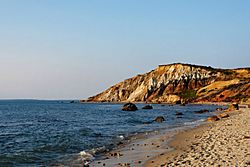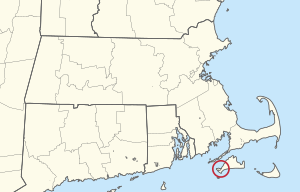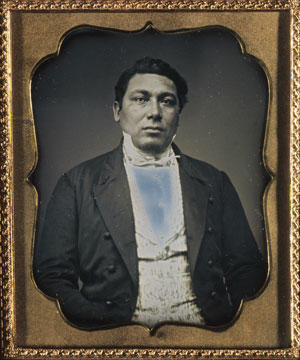Wampanoag Tribe of Gay Head facts for kids
| Âhqunah Wôpanâak | |
|---|---|

Gay Head Cliffs, Aquinnah, Martha's Vineyard
|
|
| Total population | |
| 1,121 | |
| Regions with significant populations | |
| Languages | |
| English, Wampanoag | |
| Religion | |
| traditional tribal religion | |
| Related ethnic groups | |
| other Wampanoag people, Narragansett people |
The Wampanoag Tribe of Gay Head (Aquinnah) (which they call Âhqunah Wôpanâak) is a federally recognized tribe. This means the United States government officially recognizes them as a Native American tribe. They are part of the larger Wampanoag people. Their home is in the town of Aquinnah, located on the southwest tip of Martha's Vineyard in Massachusetts. Every year, the tribe celebrates Cranberry Day.
The tribe gained official recognition in 1987. In the same year, a land agreement was reached for their lands on Martha's Vineyard. This agreement was made with the help of the government of Massachusetts and the U.S. Department of Interior. As part of this agreement, the government now holds 485 acres of land in trust for the tribe. This land includes 160 acres of private land and about 325 acres of common land.
Contents
How the Tribe is Governed
The Wampanoag Tribe of Gay Head is led by an elected council. This council has eleven members. The tribe also has an honorary tribal chief and a medicine man. These are special positions that are passed down through families and held for life.
|
|
How the Tribe Makes a Living
The Aquinnah Wampanoag tribe runs a shellfish hatchery on Menemsha Pond. Here, they grow oysters. Tourism is also very important for the tribe. Many tribal members own their own businesses. Some members have to move away from the island to find jobs.
Tribe's Long History
Wampanoag people have lived in the Aquinnah area of Massachusetts for thousands of years. Long ago, they fished, grew crops, and hunted whales. In the 1600s and 1700s, English settlers began moving into the region. They started taking over Wampanoag lands. Over time, the Wampanoag lost much of their land. Some Wampanoag people married English colonists and later European-Americans.
The Wampanoag had a special way of tracing their family lines. It was called a matrilineal kinship system. This meant that children born to Wampanoag women were always considered Wampanoag. This helped them keep their culture alive. Family names and property were passed down through the women's side of the family.
In the 1800s, many Wampanoag men worked on whaling ships. Some became important leaders on these ships. For example, Amos Hoskins became the captain of a ship called the Massasoit in 1851.
The 1900s: A Time of Change
In 1972, the Wampanoag people on Martha's Vineyard formed a group. It was called the Wampanoag Tribal Council of Gay Head, Inc. Their goal was to protect their culture and gain more control over their own future. In 1974, they filed a land claim lawsuit. They wanted to get back about 3,000 acres of land. This land had been lost to the state and town many years before.
The U.S. federal government officially recognized the Wampanoag Tribe of Gay Head (Aquinnah) on April 10, 1987. This was a very important step for the tribe. As part of the Massachusetts Indian Land Claim Settlement Act of 1987, the federal government agreed to hold about 485 acres of land for the tribe. This included 160 acres of private land and about 325 acres of common land. The town of Aquinnah also gave some land. The state of Massachusetts gave money to help the Wampanoag buy land for everyone to use.
These common lands include famous places like the Gay Head Cliffs, Herring Creek, and Lobsterville. The tribe also owns other land on the island. The agreement explained who was responsible for what. It also explained who had power over different areas.
The 2000s: New Challenges
In 2013, the tribe suggested building a small gaming center. This was a different idea from an earlier plan for a larger casino. The state and town did not agree with this plan. They took the tribe to court. In June 2016, a court ruled against the tribe. The judge said the tribe had to follow state and local rules about gambling. The judge also said the tribe did not have enough control over its land to manage a gaming center. For example, the tribe did not have its own police or fire department.
However, the federal government supported the tribe. They said there were mistakes in the judge's decision. The tribe appealed the ruling in December 2016. The U.S. Department of Interior supported their appeal.
In February 2019, the tribe announced they would start building the Aquinnah Cliffs Casino. They planned to begin construction in March 2019. The Wampanoag Tribe of Gay Head decided to go ahead with building. This was despite some opposition from the towns of Aquinnah and Chilmark. The tribe believes that these towns do not have jurisdiction over their project.
Notable Aquinnah Wampanoag People
- Gladys Widdiss, a respected elder in the Aquinnah reservation.
 | Tommie Smith |
 | Simone Manuel |
 | Shani Davis |
 | Simone Biles |
 | Alice Coachman |



